 Acknowledgment
Acknowledgment
With love and appreciation, I would like to recognize
Stephanie Matthiesen for the special contributions she has
made to this 6th edition of Essential Words for the TOEFL. This ebook may appear differently depending on what type of device you are using to view it on. Please adjust your device accordingly. This ebook contains hyperlinks that will help you navigate through the content, bring you to helpful resources, and allow you to click between practice questions and answer explanations. Copyright 2014, 2011, 2007, 2004, 1999, 1992
by Barrons Educational Series, Inc. All rights reserved.
No part of this book may be reproduced or distributed
in any form or by any means without the written permission
of the copyright owner. All inquiries should be addressed to :
Barrons Educational Series, Inc.
250 Wireless Boulevard
Hauppauge, New York 11788
www.barronseduc.com eISBN: 978-1-4380-9263-8
C ONTENTS
What vocabulary is necessary to score high on the TOEFL? Why is it especially important to have a strong vocabulary for the current TOEFL? Why must I improve my vocabulary and how can I succeed? How can I be a better TOEFL test taker? Essential Words for the TOEFL answers these questions and provides you with a proven plan for improving your English vocabulary while also preparing you for the TOEFL. The words and practice questions that appear throughout this book will help you to maximize your understanding of words that will likely appear in every section of the TOEFL. Important information about how to maximize your score on the TOEFL is given in addition to vocabulary building hints and exercises. By following the program and mastering the words in this book, you will be ready to earn a higher score on the TOEFL. This 6th edition of Essential Words for the TOEFL has an extensive, revised list of 500 words with improved exercises and updated reading selections.
This edition makes Essential Words one of the most thoroughly researched books of its kind. It is the product of extensive study of previous TOEFLs and academic materials from which the questions on the TOEFL are produced. The result of this research is this powerful book of words that will lead you to success on the TOEFL.
This book is divided into six chapters. This introduction gives you basic information about their contents and how to use the book. Lets look at the six chapters.
Getting to Know the iBT Chapter 1 describes the complete iBT test format and contains sample questions from each part. The questions are explained in detail and test-taking strategies are introduced. Understanding the Internet-Based TOEFL Chapter 2 describes the importance of building a strong vocabulary in order to score well on the iBT. You will find sample reading passages typical of those found in Section One of the iBT with a detailed analysis of the kinds of words and questions that are found on the TOEFL. In this chapter you will learn important strategies and hints to follow that will increase the probability of maximizing your score on the TOEFL. Improving Your TOEFL Vocabulary Chapter 3 gives you a plan for studying vocabulary.
You should use the plan when studying the words in this book. Building Your TOEFL Vocabulary Chapter 4 provides powerful information that helps you build your TOEFL vocabulary. You will be introduced to roots, prefixes, and suffixes; parts of words that provide or add meaning. You will also be introduced to dictionary and thesaurus use, both print and online resources that contribute to any strategy to build your TOEFL vocabulary. The Essential TOEFL Vocabulary Barrons TOEFL Vocabulary Building Program is explained in Chapter 5. The carefully selected words that appear on the list are important for all TOEFL test takers.
An explanation of the program is given, including how to study the list, how to understand the words, and how to follow the program from beginning to end. Thirty carefully developed vocabulary lessons follow the explanation. Each lesson ends with practice questions like those that appear on both the iBT and the ITP, the paper-based TOEFL. The iBT Practice Reading Test Chapter 6 contains a complete practice iBT reading test, typical of those found in Section 3 of the TOEFL. The test gives you practice with reading comprehension and vocabulary questions that closely follow the iBT format. At the conclusion of the practice test, you will be able to assess your iBT knowledge and skills by using the included answer key and conversion tables to convert your number of correct answers to a score on the TOEFL scale.
Both the iBT and ITP scales are included. Chapter 6 is followed by an index of the 500 essential words presented in this book, followed by the page number where the word can be found in the text. A Final Word The 6th edition of Essential Words for the TOEFL is a product of more than 20 years of research and continuous updating. Among the thousands of words that TOEFL test makers can use, this edition of Essential Words for the TOEFL presents those words that are predictably the most likely to appear often on the iBT. By mastering the words and applying the strategies presented in this book, you will be well on your way to a higher score on the TOEFL. Steven Matthiesen
The TOEFL is a comprehensive English language examination that helps colleges and universities in the United States, Canada, and other parts of the world make admission decisions.
It is also used by some organizations to certify professionals to practice their vocations both in the United States and abroad.
For many years, the TOEFL was administered only in a paper-based format. Examinees marked their answers with a pencil on an answer sheet. The test primarily assessed listening comprehension, grammar, vocabulary, and reading skills. Then, beginning in 1998, the Educational Testing Service (the maker of the TOEFL) began offering a computer-based TOEFL known as the iBT.
Some educational institutions use a paper-based TOEFL, known as the ITP TOEFL.
Some educational institutions use a paper-based TOEFL, known as the ITP TOEFL.
The Educational Testing Service makes this form of the TOEFL available to institutions who often use the test to generally assess individuals English language skills for placement purposes. Institutions also use results to assess the effectiveness of their English language instructional programs. These TOEFLs are typically previously administered paper-based TOEFLs. Generally, colleges and universities do not accept ITP TOEFL scores in place of an iBT score. The two versions of the TOEFL are quite different.
The iBT is a timed test that consists of the four sections listed below.
| Section 1 | Reading | 60100 minutes |
| 34 Passages | 1214 questions per passage |
| Section 2 | Listening | 6090 minutes |
| 23 Conversations | 5 questions per conversation |
| 46 Lectures | 6 questions per lecture |
| Section 3 | Speaking | 20 minutes |
| 2 Independent Tasks |
| 4 Integrated Tasks |
| Section 4 | Writing | 50 minutes |
| 1 Integrated Task |
| 1 Independent Task |
The iBT reading section is presented in two formats.
Next page
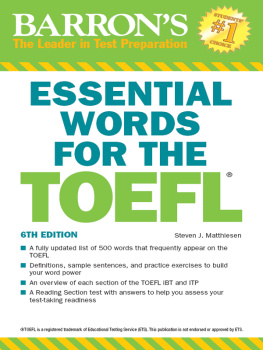
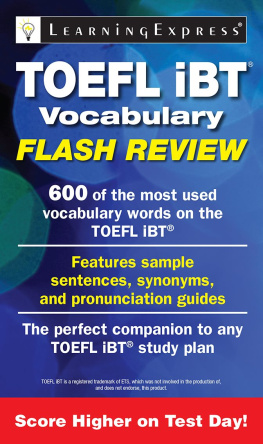
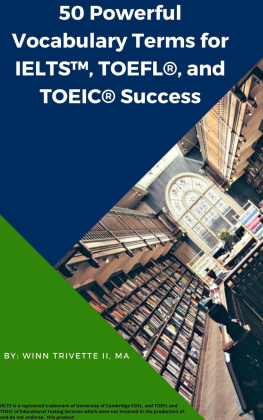
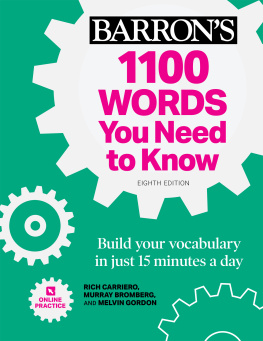
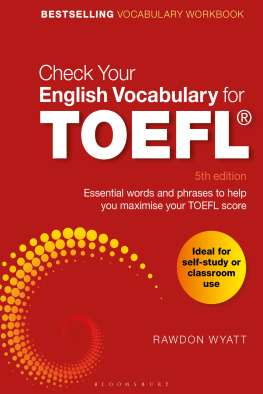
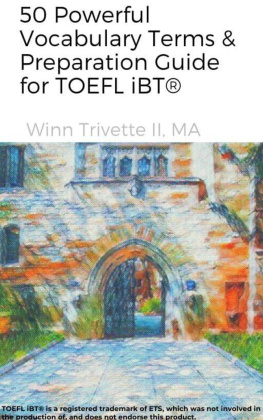


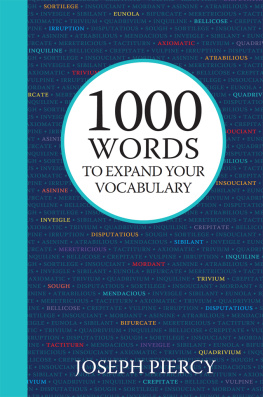
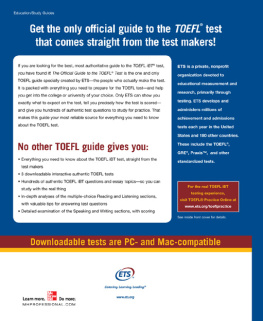
 Acknowledgment
Acknowledgment